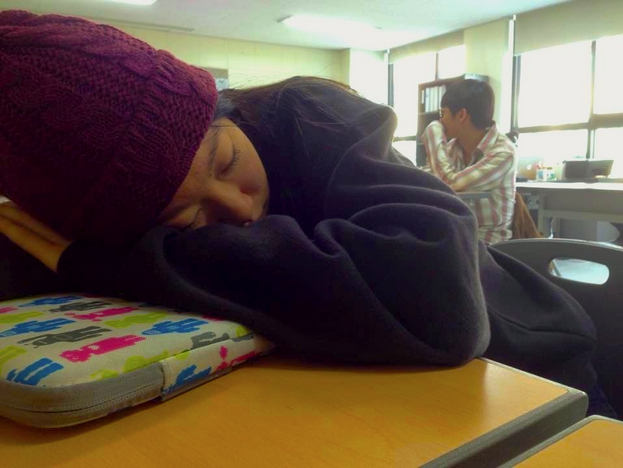![Forty-five percent of students sleep less than seven hours on school nights. Many students sleep in classes at school due to this nighttime deprivation. [Sun Jae Lee]](http://www.jstudentboard.com/reporter/wp-content/uploads/2014/10/JSR_Oct18_Sleep-300x225.jpg)
According to the National Sleep Foundation, teenagers ought to get at least nine hours of sleep every night. However, according to a 2006 survey conducted by the foundation, only 20% of students between the ages of 11 and 17 sleep an average of nine hours on school nights, whereas 45% of students sleep less than seven hours on school nights.
There are many consequences to such sleep deprivation, many of them academic. Sleep is responsible for helping strengthen neural connections that build enduring memories; so, while many choose to give up sleep to finish more work, this actually impairs concentration, productivity, and memory consolidation.
“According to the University of Texas Learning Center, every hour of sleep you miss is the equivalent of consuming one alcohol drink on your cognitive abilities,” said Cassandra Summerton, an AP Psychology teacher at Korea International School, in an interview with JSR.
“Coming to school sleep deprived is like drinking three shots of soju before walking into class each day and expecting to learn,” Summerton said. “In our very busy lives there just isn’t enough time to do everything. We have to make sacrifices, but sleep just shouldn’t be one of them.”
Not only does sleep deprivation lead to slowed performance, it also leads to the suppression of the immune system and can cause illness. According to Science Daily, a lack of sleep increases the risk of cardiovascular diseases and type 2 diabetes. According to the National Center for Biotechnology Information, sleep deprivation negatively impacts “mortality, morbidity, performance, accidents and injuries, functioning and quality of life, family well-being, and health care utilization.”
This suppressing of the immune system not only makes people more prone to illness, it also puts the body at a disadvantage when it needs to fight infection. In fact, adequate sleep can help people avoid illness better than medications can.
According to Dr. John Park, a pulmonologist who specializes in sleep medicine at the Mayo Clinic in Rochester, Minnesota, “We know that our immune response is suppressed when we are sleep deprived and that we develop less antibodies to certain vaccines if we are sleep-deprived. It takes longer for our body to respond to immunizations, so if we are exposed to a flu virus, we may be more likely to get sick than if we are well rested when vaccinated.”
“I tend to give up sleep rather than risk getting a bad score or submitting sub-par work,” said Stephanie Yang, a senior at Korea International School, to JSR.
Yang continued, “That being said, a lecture in my AP Psychology class made me realize that sleep deprivation is actually a problem that is a lot more serious than I had thought it to be. I try to sleep earlier these days!”

